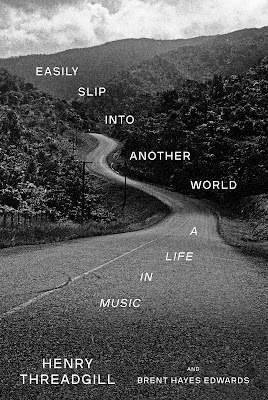By Gary Chapin
About two-thirds of the way into his memoir, Easily Slip Into Another World: A Life in Music, Henry Threadgill let’s us know:
There is an expectation that an artist’s autobiography will function as a primer, providing “explanations” of the art. But this book is not a listening guide. If anything, it is an extended defiance of that expectation. If it’s meant to teach you anything about my music, it starts with the lesson that you need to relinquish that desire for transparency. Music is about listening. Nothing I can say can mean anything once you start to listen. (p 259)
And I thought, “Dang!” Because, while I wasn’t expecting a primer or “explanations,” the experience of reading the book did not mean “nothing” to me when I listened to the music. Threadgill’s life and stories were helping me get closer to the music, providing a new perspective or context for the music, or a new entry point. I’ve been listening to Threadgill since 1988, maybe I needed a new entry point to remind me how much joy is there. (I notice, as I get older, I need that reminder about a lot of things.) Still, Threadgill’s questioning (or denial) of the relationship between his words and his music fascinated me.
Regardless, it’s important to say, in and of itself Easily Slip Into Another World, is a wonder of a book. I have read far more than my fair share of music biographies and memoirs, especially of avant musicians, and this is easily the best. Yes. I’ll repeat. The best. Easily.
The most important reason for this is that Threadgill (with Edwards) is an amazingly good storyteller—the type of storyteller who could tell a story about anything and have you in the palm of their hand. Every music bio has that section at the beginning about ancestors and childhood. I suppose it’s necessary, but it almost always leaves me impatient. (“Okay, okay, Bach’s dad was a bagpiper. Can we get to the Cantatas?”) Threadgill, from the first sentence, draws you in with stories of Peyton Robinson, his great-grandfather. Each story has that urgency of “So there I was …” (even if Threadgill wasn’t actually there). It’s a superpower, this kind of storytelling, to use words to leave you desperate to know, “What happens next? How’s it going to end?”
Incidents of neighborhood racism in Threadgill’s late ‘50s/early ‘60s Chicago leave us angry and uneasy. Brief encounters with Sun Ra and his band leave us envious. The section on his time in Vietnam is genuinely harrowing, edge-of-your-seat stuff. I can imagine the movie made from just that chapter. When he returns to Chicago afterwards, Threadgill pursues different relationships, educational opportunities, friendships, and musical experiments.
He is of the AACM (Association for the Advancement of Creative Musicians), but, because of his time away, not enmeshed in it. He takes us through the formation and story of Air, the Sextett, Zooid, etc. Certain relationships stuck out to me, I’m not always sure why—such as that with guitarist Brandon Ross. It’s not prominent in terms of the word count given to it, but it feels meaningful.
As we watch him assemble and disassemble different ensembles over time, looking for his sound (not THE ONE sound, but the sound he needs at that moment), you can see his fascination with the mixture of timbres (something I heard Threadgill comment on in the ‘90s). Whether it’s a phalanx of basses, or the stringreedbrass mixture of the Sextet, or the accordion on Song Out of My Trees, you can see his fascination with the sounds of instruments and their players, and their place in his writing. For example, he’s had a bunch of cellists and a bunch of tuba players over the years, but I can always tell when it’s a Threadgill cello or a Threadgill tuba.
In the way of great storytellers, the language here is nonviolent, never engaging in the gossip of so much music-oriented writing. It also never seems to gloss over things that someone like Ellington would in his autobiography. He talks about the drugs, racism, and divorces because they happened. They were part of the context. But I never feel as if I’m a voyeur. It’s an extraordinary balance he achieves.
Easily Slip Into Another World doesn’t bring us up to the minute, but it gets pretty darn close. He talks of his relationship with Pi Recordings and its blessings. It wasn’t his Pulitzer that made Threadgill into an elder statesman of “this kind of music,” but it helped. The story of his relationship with the Indian state of Goa—first missing a chance to play there, then playing there, then getting lost in the jungle and … nevermind, I won’t spoil it—is one of the most beautiful and endearing of the book.
I suppose Threadgill is right, and the book doesn’t provide transparency in the sense of answers about his music—although his explanation of the Zooid approach to harmony is wonderful “inside baseball”—but it does help you approach the music with good questions. My experience of this book (as important as my evaluation or analysis) was one of rapt enjoyment, and also fascination. I know it’s the second time I’ve used that word, but it’s genuinely true that one quality of great music to me is that it is fascinating. Among all its other qualities, Henry Threadgill’s music is fascinating to me. This book is fascinating. The two fascinations amplify each other.















0 comments:
Post a Comment